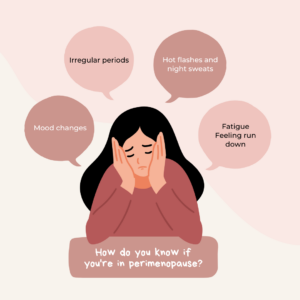Perimenopause is the phase before menopause. Perimenopause is a process rather than a single event that happens. Perimenopause can start anywhere from two to twelve years before your periods actually stop. Some women experience them as early as their mid-to late 30s, and most commonly in their 40s and 50s.
Menopause is the life phase that begins one year after your periods actually stop. Some women also undergo menopause that is surgically or medically induced. For example if you’ve had a hysterectomy or partial hysterectomy or taking certain medication.
During perimenopause, women may experience a range of physical and emotional changes. Many of these symptoms are temporary, some last longer and can vary in intensity.
We will explore some of the common signs and symptoms of perimenopause to help you understand whether or not you may be going through this transition.
Irregular Periods:
One of the most common signs of perimenopause is irregular periods. You may start to notice changes in your menstrual cycle, such as periods that come more frequently or less frequently, or periods that are shorter or longer than usual. Some women may experience heavier or lighter bleeding during their periods. You can also experience more painful periods.
Hot Flashes and Night Sweats:
Hot flashes and night sweats are also common symptoms of perimenopause. A hot flash is a sudden feeling of warmth that spreads over the body, often accompanied by sweating and flushing of the skin. Night sweats are similar to hot flashes, but they occur during the night and can disrupt your sleep.
Mood Changes:
Perimenopause can also bring about changes in your mood. You may find that you are more irritable, anxious, or depressed than usual. You may also experience mood swings or have trouble sleeping due to anxiety.
Vaginal Dryness:
Another symptom of perimenopause is vaginal dryness. As estrogen levels decrease, the tissues in the vagina can become thinner and drier, leading to discomfort or pain during sex.
Decreased Libido:
Perimenopause can also affect your sex drive. You may find that you are less interested in sex than you used to be, or that you experience pain or discomfort during sex.
Fatigue:
Perimenopause can also cause fatigue or a general feeling of being run down. This can be due to hormonal changes, as well as disrupted sleep patterns caused by night sweats or other symptoms.
Some other symptoms can include memory problems, weight gain, changes in skin, digestive issues, headaches, and joint pain.
There are a wide range of symptoms that women can experience in perimenopause. This is because hormonal changes that occur can affect different systems and organs in the body. Estrogen, in particular, plays a key role in many bodily functions, including the menstrual cycle, bone health, brain function, and skin health, among others.
Perimenopause is a highly individual experience, and women may experience different symptoms at different times or to different degrees. It’s also important to rule out any underlying health conditions that could be causing these symptoms.
The most important thing to note is that the perimenopause and the early years of menopause is a critical window of time for your health. How you take care of yourself in perimenopause can influence your health in the long term. If you don’t address the changes happening in your body now, they can become a larger health problem later on.
While perimenopause is a natural transition, there are ways to manage the symptoms and improve your quality of life during this time.
In my next blog, I’ll discuss natural approaches to perimenopause symptom relief.
Remember that you are not alone, and that there are ways to manage the symptoms of perimenopause and maintain your health and wellbeing during this transition. Listen to what your body is telling you and seek advice from a health care practitioner if you are experiencing symptoms that are impacting your quality of life.

